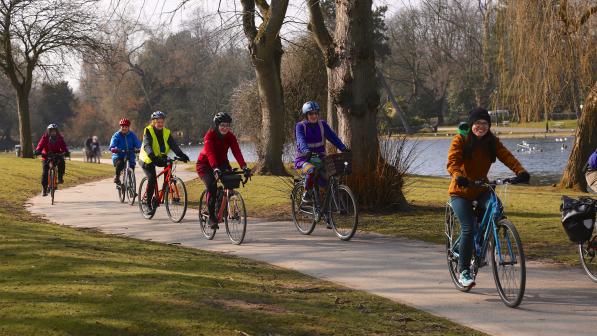What does staying local mean? Sport minister responds to Cycling UK's call for clarity

With lockdown still in place across the nation, keeping active is more important than ever to maintain both physical and mental wellbeing. However, many cyclists have been left confused by ambiguity in English government guidance. We are told that taking daily exercise is one of the permitted reasons for leaving our homes, while at the same time we are being urged to stay at home, stay local and avoid unnecessary travel. Media reports of fines being issued by police have only added to the uncertainty, and Cycling UK has received many enquiries and requests for clarification.
Therefore, last month, Cycling UK, along with British Cycling and British Triathlon, wrote to the Department for Digital, Culture, Media and Sport to ask for additional guidance on how far it is acceptable to travel for exercise. Our letter pointed out that while for many people exercise starting and ending from the front door is appropriate, for others, for instance those with disabilities or who have small children, it may be necessary to travel a short distance to find a suitable place to exercise.
We have now received a response from Nigel Huddleston, the minister for sport. While his reply stops short of imposing any firm defintion of "staying local", it does acknowledge the points we made. The minister wrote:
"I appreciate the concerns you raise and agree that sport and physical activity play a crucial role in supporting people to be active and healthy. No government would want to be in a position of needing to restrict something that brings so many benefits to so many people and communities.
"However, Covid-19 cases remain high across the country and the single most important action we can all take is to stay at home to protect the NHS and save lives.
"As you are aware, the government’s current guidance regarding outdoor exercise states that people are allowed to leave their home to exercise outdoors, and should remain as local as possible.
"As you state, people’s circumstances are different and so this guidance relies on people to use their common sense to determine what is and is not a reasonable distance for their outdoor exercise.
"As we navigate these necessary new restrictions, we remain clear on just how important exercise is to people's health and wellbeing, whilst staying safe at home."
People’s circumstances are different and so this guidance relies on people to use their common sense to determine what is and is not a reasonable distance for their outdoor exercise
Nigel Huddleston, minister for sport
Duncan Dollimore, Cycling UK's head of campaigns, commented: "Physical inactivity is responsible for one in six deaths in the UK, so while everyone must comply with coronavirus regulations and guidance around outdoor exercise, it’s also essential for the nation’s health and wellbeing that people aren’t dissuaded from exercise through misinformation and a perception that they’re doing something wrong by trying to stay active, keep themselves healthy, and get some fresh air.
"Tragically, too many have been, with a recent UCL report indicating that 40% of people were now exercising less than they were during the first lockdown.
"That’s why Cycling UK is relieved that, in England, the government has reiterated the importance of physical exercise while complying with the guidance – and, critically, that individual circumstances are different and the guidance relies on people using common sense. We have been inundated with questions about how far and for how long people can cycle or exercise outdoors, and what ‘local’ means, so clarification that some common sense can be applied is extremely helpful, and will hopefully reassure people that they can go for a bike ride, a run or a walk, provided they use their reasonable judgement."
Cycling UK has updated its coronavirus cycling guidance to reflect this latest clarification, and encourages people to continue to cycle for exercise during the current lockdown, but to do so in a manner which minimises risk. For example, cyclists should avoid crowded or narrow routes where social distancing is difficult to maintain, but also bear in mind that they may put others at risk if they suffer an injury or mechanical problem far from home and require rescue. To minimise unnecessary travel, rides should start and end at home if this is practical; however, common sense may dictate that travelling a short distance to a more suitable location is reasonable.

